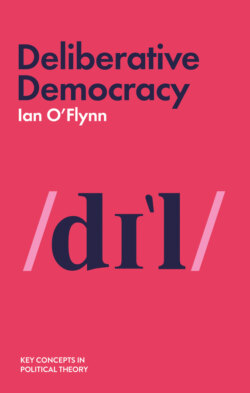Читать книгу Deliberative Democracy - Ian O'Flynn - Страница 5
Preface and Acknowledgements
ОглавлениеWhen Polity’s George Owers asked me to write this book, I was both pleased and excited. Having worked on deliberative democracy for more than twenty years, I saw it as an ideal opportunity to set down on paper some of the many things that I had learned. It was a chance both to organize my own thinking and, I hoped, to lend some renewed clarity to the field. On the other hand, the thought of evaluating a field as large, diverse and, in many important respects, contentious as deliberative democracy struck me as a daunting prospect. Important new articles seem to be published on an almost daily basis, while major books appear with frightening regularity. Of course, this is simply a reflection of the richness of the field – the vibrancy of the topic, its capacity to excite and, deep down, the sense that the world would be a much better place if only it were more like deliberative democracy. The problem that I faced, however, was what to include and what to set aside.
In the first instance, this book is about the concept of deliberative democracy and the many different ways in which the concept has been understood. It is, more specifically, about deliberative democracy as a normative project – a project concerned with evaluating existing democratic institutions and practices and proposals for their reform. It almost goes without saying that normative claims imply empirical questions, some of which are discussed in this book. However, the book is principally located in the broader field of political theory (or, if one prefers, political philosophy).
Of course, political theorists disagree among themselves about the nature, scope and purpose of deliberative democracy. My view is that deliberative democracy is essentially concerned with the question of political legitimacy. It is concerned with the process or processes by which governments acquire the right or authority to make decisions that are binding on us all. On a deliberative view, what matters is not that people talk and argue with one another, but that they genuinely attempt to discuss with one another, seeking out reasons and considerations that are in principle acceptable to all. Granted, in modern mass democracies, the idea that elections should be free and fair is also an important part of the story. But ultimately what matters is meaningful public discussion about the important decisions of the day. Some deliberative democrats shy away from the emphasis on decision-making. Some are more concerned with democratic deliberation (even if that has little direct bearing on governmental decision-making or occurs in nondemocratic political settings) than with deliberative democracy as I have just described it. Yet while these alternative perspectives do appear at points throughout the book, they are not central to it. They are not central because, in my view, our guiding concern should be the legitimacy of the decisions that governments make in our name.
I should also say that, while the book is about the concept of deliberative democracy, it seemed to me essential to engage with the major figures in the field. No serious book on deliberative democracy could fail to engage with the works of both Jürgen Habermas and John Rawls. Nor could it fail to engage with the works of thinkers such as Joshua Cohen, John Dryzek, Robert Goodin, Amy Gutmann and Dennis Thompson, James Fishkin, Jane Mansbridge and Mark Warren. Certainly, there are many other important thinkers in the field, but the choice of these thinkers needed little or no justification.
In preparing this book, I have received a great deal of help and support. First and foremost, I must thank my colleague, Peter Jones, for many years of discussion on these and other related philosophical topics. I must also thank Albert Weale for all his years of generous mentorship and support. I am grateful to Jane Mansbridge for extensive comments on the original proposal. I also received helpful comments on the proposal from two anonymous referees. For comments on the entire manuscript, I must thank George Owers, whom I must also thank for commissioning the book in the first place, as well as Polity’s three anonymous readers. The readers were both insightful and encouraging, and the book is certainly all the better for having been put through the review process. For comments on individual chapters, I wish to thank André Bächtiger, Ron Levy, William Smith and Albert Weale. Directly or indirectly, the book has also benefitted from discussions at various points over the years with Emmanuel Ani, Richard Bellamy, Didier Caluwaerts, Manlio Cinalli, Nicole Curato, John Drzyek, Stephen Elstub, Selen Ercan, Oliver Escobar, Andrea Felicetti, James Fishkin, Matteo Gianni, Robert Goodin, Marco Guigni, Marit Hammond, Clodagh Harris, Hoi Kong, Ian Johnson, Andrew Knops, Jonathan Kuyper, Ruth Lightbody, Robert Luskin, Peter McLaverty, Michael Morrell, Simon Niemeyer, Tony O’Connor, Shane O’Neill, John Parkinson, Vijayendra Rao, Stefan Rummens, David Russell, Victor Sanchez-Mazas, Jensen Sass, Maija Setälä, Gaurav Sood, Ana Tanasoca, Paul Vittles, Mark Warren and Marta Wojciechowska.
I owe the biggest thanks of all to my family. Writing this book was an arduous task and it would not have been possible without their encouragement and support. All too often, I worked on the book when I really should have been with them. For that I am sorry. This book is dedicated, with love and gratitude, to my wife Laura and our two wonderful children, Isla (aged six) and Tom (aged four).
